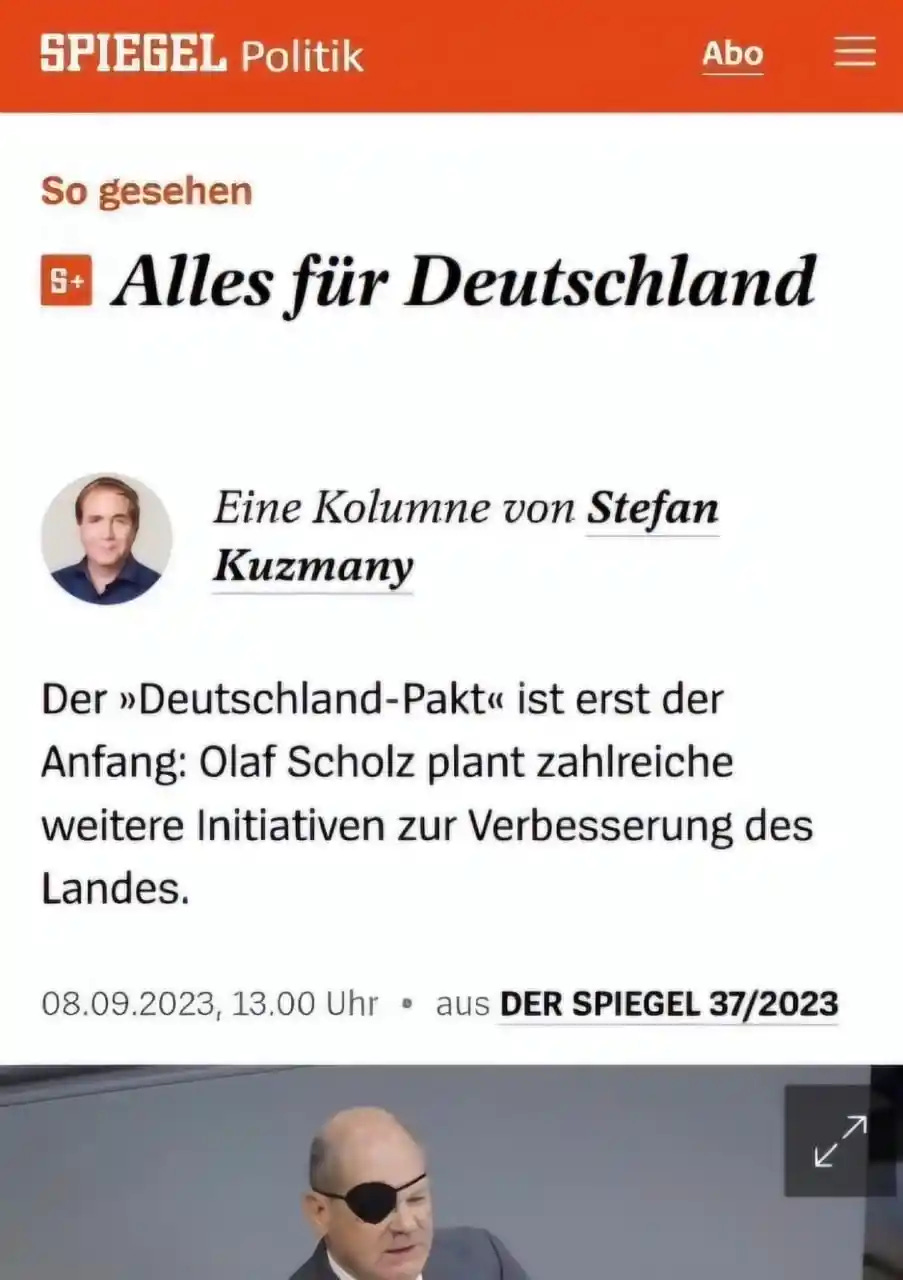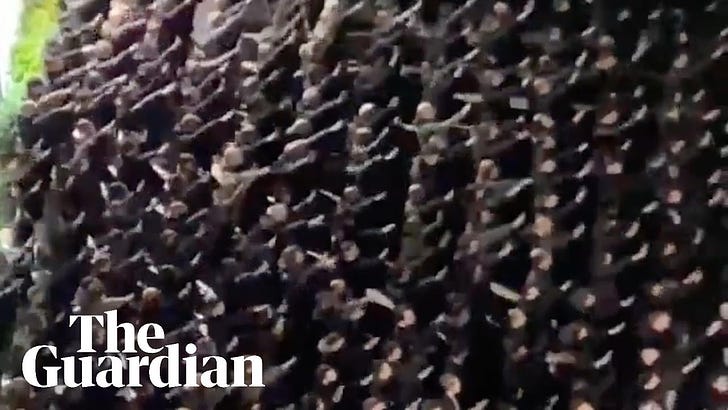The Decline of Germany's Word Power: From Precision to Cacophony.
🗓️ 13-20 April / Olaf Scholz's empty speeches, Annalena Baerbock's undiplomatic words, the CDU's clumsy sentences, and the boundaries of the speakable. Weekly bites from Berlin and Beyond.
Germany is notorious for its love affair with language. Dictionaries fly off the shelves and debates about word choice dominate editorials. This meticulousness extends to national security, of which the Federal Office for the Protection of the Constitution (Verfassungsschutz) is the core, where extensive lists dictate acceptable expressions.
For decades, Germany's political influence reflected or even exceeded its economic power (despite recent stumbles, it remains the world's third largest economy).
This influence was partly due to its exceptional verbal leadership. Think of Angela Merkel: her words, scientifically precise yet accessible, sometimes coined for specific situations, resonated globally. They were meant to inspire and endure: "Wir schaffen das!" (“We can make it!”, 2015) like it or not, is now on Wikipedia and in the history books, and it was the hallmark of a generous and optimistic country, aware of its past and its present role. Now that Merkel is gone and the world is on the brink of (or already in) a global war also fuelled by linguistic dissonance, that mastery feels dearly missed.
Fast forward to this past week. German public discourse has never been more dependent on words, and yet the picture couldn't be more disheartening: empty statements (Chancellor Olaf Scholz in China), out-of-control or unbalanced words (Annalena Baerbock in Israel), backtracking on written manifestos (the CDU's basic political programme) and the fantasy that banning words will eradicate ideas (the State vs. Björn Höcke).
The aftermath leaves a bitter taste: Germany, once a political heavyweight, now feels like a featherweight on the world stage. Its ruling elite - with few exceptions - seems ill-equipped for the challenges ahead.
Words matter. Used effectively, as in the case of Estonian Prime Minister Kaja Kallas, they can transform a small nation into a global actor. In stark contrast, Germany - government, opposition, media, institutions - is discovering that a once powerful voice diminishes without the knowledge of how to use it. This is a cacophonous chronicle of a week from Berlin and beyond.
1. Empty words that can't hide the reality: Olaf Scholz in China, trading for apples.
Last Saturday Olaf Scholz started his most important foreign trip to date - a China visit reminiscent of Angela Merkel's business-focused excursions, the ones with delegations of more than 40 businesspeopke and the promise to bring home lots of new business. But the mood quickly turned grim. News of an attack on Israel forced a change of plans before he even landed.
Three days of talks tackled serious issues: the war in Ukraine, Taiwan, the Middle East and the crucial balancing act of de-risking German-Chinese trade without a complete breakdown.
Xi Jinping met with Scholz for a good three hours, plus 45 minutes in private, a lunch, a larger roundtable. Oh dear: that was a thing!. But the "good old days" of joint announcements for new big business and agreement did not come.Major questions remained unanswered.
❊ Would China commit itself to the Swiss peace conference on Russia-Ukraine or to an active role in the Middle East? No answer.
❊ On trade, Scholz was even lectured on 'free market principles' - meaning cheaper Chinese cars flooding the EU market despite accusations of Chinese state subsidies distorting prices.
❊ Scholz's insistence on the inviolability of Taiwan's borders? Well-crafted public statements that failed to trigger a reaction.
And what did Germany get for all its talk? Apples. China lifted export restrictions on German apples in exchange for looser restrictions on its technology products, a fact President Xi was delighted to point out.
Scholz, always Germany's best political spin doctor, sold his empty achievements with 2:40 mins of his famous "Scholzomat" - that well-oiled machine for saying nothing in twice as many words needed:
About EU-DEU-CH relationship: “It is being talked about very intensively all questions of the bilateral relationship between Germany and China, about the relationship between Europe and China, about the question of global development and also a whole series of topics that we have also discussed here in public.”
READ: MANY TALKS, FEW RESULTS
About Ukraine: “…we support Ukraine as intensively and as long as it is necessary, and at the same time that we advance the diplomatic efforts that Ukraine is also very intensively concerned about.”
READ: THIS IS US, DO NOT ASK ME ABOUT CHINA´S POSITION
About Hamas/ Israel: “…We have exchanged our perspectives and also discussed what is necessary for this. Germany has a clear position.”
READ: WE DID NOT REACH ANY COMMON POSITION
About trades between Germany and China: “Of course, there have been issues and relations that need to be discussed in more detail, (…) such as the question of the level playing field for German companies here in China. I think good things have been achieved there, too.”
READ: WE CAN SELL MORE APPLES IN CHINA 🍎 🍎 🍎
2. Words that go wrong: Minister Baerbock's undiplomatic diplomacy.
In the meantime, Foreign Minister Annalena Baerbock has made her seventh trip to Israel since the terrorist attack on 7 October, and the last one went right after the Iranian attack: seven trips,matching US Secretary of State Blinken.

Baerbock's diplomacy - informed by a feminist foreign policy - is very much about being present and generating images. Legitimately. But is her "feminist foreign policy" more about presence than impact? And what about the choice of words?
While being there is important, Baerbock's choice of words has repeatedly caused tension and raised eyebrows. Here are a couple of head-scratchers:
January 2023: Discussing Leopard 2 tank deliveries to Ukraine at the Council of Europe Assembly in Strasbourg, Baerbock declared:
"Yes, we need to do more, also in terms of tanks. But the most important and crucial thing is that we do it together - and stop blaming each other in Europe. Because we are fighting a war against Russia, not against each other".
In effect, many observers said, Baerbock unilaterally declared war on Russia. Or at least she is at war with diplomatic language and its formulations.
September 2023: In an interview with Fox News, she called Xi Jinping a "dictator":
“If Putin were to win this war, what sign would that be for other dictators in the world, like Xi, like the Chinese president? Therefore, Ukraine has to win this war.”
While President Biden did the same, it's questionable diplomacy, especially given the importance of the China talks for trade and security.
17 April 2024. Baerbock travelled to Israel to underline Germany's solidarity following last weekend's attack on Iran. But she also raised the critical humanitarian situation in Gaza - to which Netanyahu responded with a presentation of photos meant to show the opposite: bustling markets full of food and Palestinians enjoying beaches and sunshine.
Israel's Channel 13, followed by Germany's Bild (paywall), reported that Baerbock and Netanyahu had a frank exchange about the plight of Palestinians in Gaza.
According to the reports, Baerbock criticised the images for not showing the true reality: while some areas have markets with food, others are still facing severe famine. Baerbock offered to show Netanyahu photos on her phone of malnourished children in Gaza. She advised him to stop circulating his pictures as they "do not describe the real situation in Gaza".
Netanyahu reacted indignantly, insisting that the video footage was genuine. Then, in an astonishing remark, he said: "It's reality. It's not like the Nazis staged it, we're not like the Nazis who created fake images of virtual reality". He was alluding to posed Nazi photos of concentration camps used as propaganda to deceive the world about the horrific conditions and genocide of Jews during the Second World War.
Baerbock reportedly countered: "Are you trying to say that reports by doctors and the international media about the famine are untrue?"
1 ❊ Baerbock was right in substance and 2 ❊ Leaking the conversation was mean on the Israeli side. But: 3 ❊ Are we sure this is how diplomacy, a discipline based on words and tone, where Germany used to be considered a master, is supposed to work?
3. Words, poorly chosen: CDU plays risky game with calls for Leitkultur.
I mentioned this in January: German parties define themselves through lengthy, carefully crafted Manifestos called “Grundsatzprogramme”. Now, with the rise of the AfD, a controversial concept is back in the spotlight: Leitkultur, the idea of a German core culture.

This reignites the debate: what defines a German citizen? As the pendulum swings away from internationalism, is there a risk of a retreat into narrow nationalism, a "small Heimat" ideology or tribalism?
The CDU, with an eye on upcoming elections and the possible fall of the current government, is planting its flag firmly on this issue. Its manifesto addresses also Islam and Muslims, but the result is ambiguous and potentially dangerous.
The draft of the CDU's new Grundsatzprogramm, presented in December last year, stated:
„Muslime, die unsere Werte teilen, gehören zu Deutschland“.
„Muslims who share our values belong to Germany".
The phrase ignited a firestorm. It implied the preemptive exclusion of Muslims from German society, singling them out as a single, targeted group.
Its unspoken 'only' ('Only Muslims who...') smelled of political opportunism, not thoughtful discourse. It threatened the constitutional order and even surpassed the AfD in xenophobic rhetoric. No more Angela Merkel's CDU, of course.
After four exhausting months of internal debate, the CDU has arrived at a longer, more moderate and constitutionally sound formulation: still a draft, to be put to the party members for a vote on the 6-8 May:
„Muslime sind Teil der religiösen Vielfalt Deutschlands und unserer Gesellschaft. Ein Islam, der unsere Werte nicht teilt und unsere freiheitliche Gesellschaft ablehnt, gehört nicht zu Deutschland.“
"Muslims are part of Germany's religious diversity and our society. An Islam that does not share our values and rejects our liberal society does not belong to Germany."
So, all's well that ends well? Not really. German Muslim Council rejected CDU's revised stance, calling it 'another attempt to stigmatise Muslims'. Chairman Aiman Mazyek argues for a broader approach that addresses "all world views and religious communities" rather than singling out Muslims for negative treatment. He believes the CDU's approach is "selective" and fuels anti-Muslim sentiment. Hard to argue with this point of view.
4. At the edge of what can be said: Björn Höcke use words to play with History.
Germany's list of banned expressions associated with Nazism or extremist groups runs to hundreds of pages. But identifying these phrases, especially in today's digital deluge, can be a futile exercise.
The challenge is to discern context and intent. Can removing a slogan really erase the underlying ideology? Censorship alone will not solve the problem of extremism. But Germany's attention to words has its reasons. The way in which the chain of rhetoric - words - deeds works (consistently and directly) is more visible here than elsewhere.
This week, the far-right AfD politician Björn Höcke had to answer for his actions in a criminal trial. He is accused of using the banned slogan "Alles für Deutschland" ("Everything for Germany") from the former Sturmabteilung (SA) of the NSDAP.
Höcke used the slogan in September 2021 during the state election campaign in Saxony-Anhalt. At the end of a speech, he shouted the triad:
"Alles für unsere Heimat,
alles für Sachsen-Anhalt,
alles für Deutschland!""Everything for our homeland,
everything for Saxony-Anhalt,
everything for Germany!"
"Everything for Germany" was a slogan of the Nazi Sturmabteilung (SA) from 1934. The former grammar school History teacher claims to have known nothing about the use of the phrase during the Nazi era: deliberate ignorance rather than genuine ignorance? And in the case of genuine ignorance, is this a case of censorship of freedom of expression?
The case is more ambiguous than one might think. According to Section 86a of the German Criminal Code, the slogan "All for Germany" is also banned if it is used in an extreme right-wing context. But unlike slogans such as "Arbeit macht frei" (Work sets you free) or "Meine Ehre ist Treue" (My honour is loyalty), the three words "Alles - für - Deutschland" have been or could be used in sports matches. In 2022, even the SPD election campaign used them on one of its billboards (well, then it took them down). And, you could find it as a journalistic headline:
As always, it depends on the context: and with all the good intentions in the world, how can we trust a history teacher who used the slogan at political rallies without knowing what kind of sentiments he was invoking?
The trial began this week and will take weeks to complete. Weeks in which words will be dissected, exhibited, analysed and debated over and over again: very German, but also increasingly cacophonous.
Whether it is Scholz in Beijing with his empty words, Baerbock in Israel with his ill-considered words, the CDU at work with itself to rewrite and correct and rewrite again, or a certain politician who titillates his voters with words that exude malice, the feeling is that words are getting out of hand, even here in the home of the cult of words. And, above all, the feeling is that this country no longer knows how to use them as a tool to assert itself.
Banning symbols, fighting ideas. Where do we stand in Germany and Italy in 2024?
A video from Italy has been circulating on social media over the past week: it comes from a commemoration held every year by neo-fascists in Rome and, as every year, it shows hundreds of arms raised in the fascist salute.









Interesting article. Informative and great to have these issues placed in context. Thank you for posting.